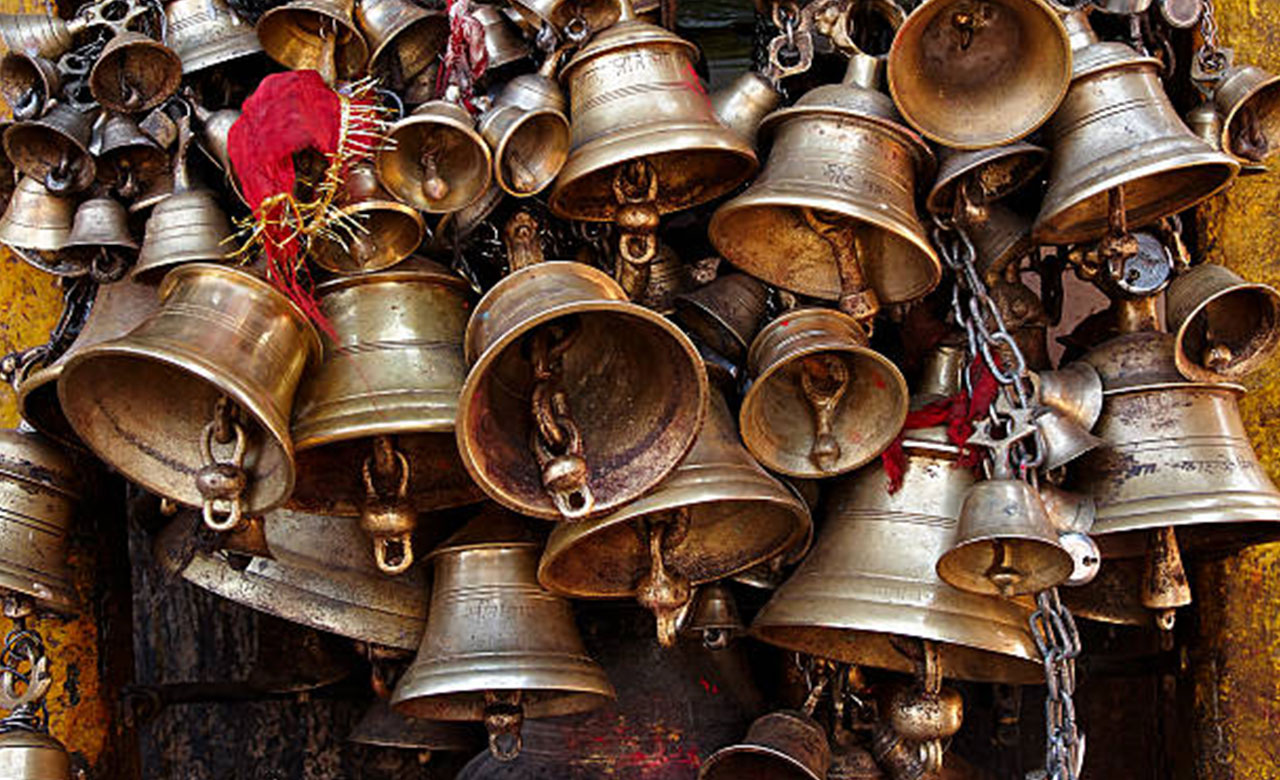
Informative
Temple Bells: Invocation of the Divine Within
आगमार्थं तु देवानां गमनार्थं तु रक्षसाम् ।घण्टारवं करोम्यादौ देवताह्वान लाञ्छनम् ॥
Inviting the Divine forces, chasing away the evil forces, I make the sound of the bell, announcing the arrival of the Gods and departure of the staint.
Removing the footwear, as you enter the temple, the first thing you do is ring the bell suspended above the entrance, proceeding further to meet God. Kids, with utmost excitement jumping up and down to stroke that tongue adds a little cheer in the otherwise serious mood of the temple.
May it be a church in Europe or the tiniest temple in an Indian village, when the temple bells make that sweet, inviting sound, everyone gathers around that sacred building to say their prayers.
Some say it is to wake up the Divine. Some say it’s to tell the Almighty that we have arrived here to see him, and few say that it is done to seek their permission to enter their house. But, Lord is never asleep, nor is he ignorant to the fact of you arriving at his doorstep, and is most definitely not expecting you to ask his permission to meet him. Then why must one ring the bell before entering the temple?
In India, you can hear bells early in the morning, at noon, and before evening prayers, as well as in between them. It attracts people’s attention. Even a passer-by cannot help himself stop on the road, remove his shoes and bow down to God if he hears the bell noises coming out of the roadside temple.
Bell is an invitation to the devotees to gather around for prayers. Even during the prayers or Arati, bells are rung to provide a rhythm to the prayers, helping the wandering mind focus on the Deity and the prayers.
The bell is not made up of ordinary materials. It’s a very precise mixture of manganese, zinc, lead, copper, nickel, chromium, iron, brass, and cadmium. The composition of these and few other metals determine the effects of the bell. Shilpa Shastra, ancient text explaining the rules of architecture and sculpting, mentions explicitly, the bell should be made with Panch Dhatu (five metals), namely copper, silver, gold, zinc, and iron. These five metals represent Pancha Mahabhoota or five elements of nature.
Every Hindu ritual involving the Gods begins with the sound of the bell, or Ghanta. It is usually used to invoke the Gods. It is believed that the frequencies of the sound made by the bell match with that of the sacred resonance of Om. As almost every sacred mantra begins with Om, every Hindu prayer starts with the bell ring.
Effects of a bell on a seeker
Bell works as a peacekeeper in a seeker’s mind, shielding it from the chaos. Temples are considered a reservoir of positivity, and one must be at peace to receive those positive vibrations from the Deity. Temple calms your subconscious, preparing your mind to absorb that positivity transmitting towards you by your Ishta.
A sound created by the bell activates both the right and left brain, creating a perfect balance in between the calculative and creative mind, connecting a seeker with himself.
The vibrations created by the bell resonance last for a minimum of seven seconds after striking the tongue. It is known that these auspicious vibrations help to cleanse the seven chakras of the body, along with expelling the dark and negative thoughts from the subconscious.
Ringing of the bell creates waves, repelling the insects and negative vibrations from the surroundings, purifying it.
Ancient Vedic scriptures had divided the bell into four parts. A curved body, representing the limitless Divine or Ananta. The tongue, making the noise representing the Divine Mother Saraswati. A handle represents life or Prana, and the figurine represents the seeker. This is how a seeker is connected with the Divine through Prana. As the Divine Mother creates the sound of the self-knowledge, it purifies the Prana, and the seeker reaches to the limitless Divine.
So next time when you enter the temple, do not forget to ring the bell to clean and calm your mind. Ring the bell to expel the negativity, tensions, and mental stress from within. Ring the bell, make yourself ready to absorb the positivity radiating from the Divine.
We hope this blog helped you understand the reason behind the ritual of ringing the bells inside the temple. In case of any queries, please write to us at info@chamundaswamiji.com
Post a Comment
-
Subscribe to Our Blog
-
Categories
-
Popular Articles
- Dead moth in the house. What universe is trying to tell you?
- Spiritual Meaning of Moth
- Vivah Bandhan Curse – What Is It and How to Spiritually Heal It.
- The Dasa Mahavidyas
- What are Beej Mantras?
- Tripura Sundari | The Dasa Mahavidya
- Maa Bhuvaneshwari | The Dasa Mahavidyas
- The Five Shades of Tantra
- Ramakrishna Paramhansa – The Man who almost became a Woman
- Maa Chinnamasta | The Dasa Mahavidyas



